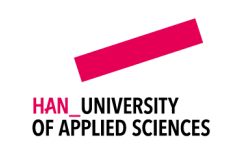This minor is offered in semester 1, Feb-Jul
Have you registered for this minor on KOM? Find out if you can join?
Email a current academic transcript to the course coordinator Rik Schelbergen rik.schelbergen@han.nl.
This transcript should show the completed courses (and grades) and currently enrolled courses.
Differentiation & Specialization course
This is a differentiation exchange course. This means it enables you to develop your professional competences in a different/broader context.
This is also a specialization exchange course. This means it enables you to further deepen your skills and knowledge within your own profession (professional profile).
For content information:
Rik Schelbergen rik.schelbergen@han.nl.
Subscribe? Good to know!
- For minors starting in September, after the registration period in March, a draw takes place in April if there are at that time more subscribers than available places.
- For minors starting in February, after the registration period in October, a draw takes place in November if there are at that time more subscribers than available places.
For the minors with places still available applies until the closing of the subscription period: Once a minor is full, it is closed!
In addition, if the number of subscribers after four weeks is below the norm; this minor may possibly be withdrawn. So if you are interested, sign up immediately!
Subscribe in time!
Note: For HAN students it means that, in case of cancellation of the first choice AFTER the period of decision (this takes a full month) they may re-subscribe for the still available minors.
Even then: Once a minor is full, it is closed!
A good overview of the HAN minors can be found in the minors app! The app is accessible via: http://www.minoren-han.nl/
This course focuses on the field of neurobiology and advanced and applied immunology.
Developments in understanding our brain and how it affects our behavior have been rapid over the past decade. It will remain a fast growing research field with many job opportunities.
It has become more apparent that inflammation and the immune system play a vital role in the development and severity of brain related diseases. On one hand, neurodegenerative diseases are becoming more and more prevalent in our ageing population. On the other hand, neuro-inflammatory diseases like multiple sclerosis also form a large unmet medical need. Another current development is the study of human microbiota and their role/influence on the (development of) the brain and the immune system. Research into brain diseases and the role of the immune system and inflammation is developing strongly, also regionally in for example world-renowned Donders Institute in Nijmegen.
Students work towards designing and performing a short research project in the field of neuro-immunology aided and/or inspired by the work field. They will be supported by tutors supervising them in journal clubs, setting up the research plan and by guest lectures from the work field. To prepare students for this, they will receive introductory and advanced lectures in neurobiology and immunology as well as practical lessons to learn the techniques necessary for their own research project. Moreover, they will gain the necessary professional skills in tutorial lessons/workshops.
The language of instruction is English. The written exams for students that do not participate in the English variant of the study program, if desired, are provided in Dutch and/or can be answered in Dutch. The professional products must be made in English.
Topics
Neurobiology
Anatomy of the central and peripheral nervous systems
Neurons and glial cells
Signaling and synaptic transmission
Plasticity and behaviour
The gut-brain-axis
Applied neurobiology
Immunology
Defense against bacteria and viruses
Tolerance
Autoimmunity
Tumor immunity
Vaccination
Data Analysis
Enhanced flowcytometry analysis
Image J
Statistical analysis
After completing this course, you will have a more in-depth knowledge on neurobiology and immunology and will be able to perform experiments and evaluate the effectiveness and benefit of basic scientific research in the field of biomedical research.
Competences
- Design
- Experimenting
- Analyzing results
- Management and administration
- Reporting / Presentation
- Planning and project-based work
- Teamwork
- Guiding/Supervising
- Professional development
For whom?
Relevant to undergraduate Biology lab students (Laboratory Technician Training) who are interested in Biomedical Research.
Students who choose Biomedical Research as part of their major have priority. In case of a large number of applications for the minor there might be an interview.
Admission requirements
1. Propaedeutic phase should be completed (first
study year).
2. Professional skills level 2, part 1 and part 2:
BMPROA/LSPROA and BMPROB/LSPROB
must be completed sufficient.
3. Practicals second year: BMMOLP/LSMOLP and
BMINTP/LSINTP must be completed sufficient.
4. Modular exams BMINTT/LSINTT TOETS-02 and
BMMOLT/LSMOLT TOETS-03 must be
completed sufficient.
General admission requirements:
You must have at least 2 years lab experience in higher vocational education in Biology and be able to display sufficient knowledge, skills and aptitude in the areas of cell Biology, immunology and molecular biology.
- Earned your propaedeutic certificate.
- Practical assessment
- Neurobiology and immunology practical
- Own practical project
- Performance assessment
- Research plan
- Research report
- Journal club presentation
- Personal development plan & reflection
- Conference
- Theory exam
- Theme test (competency based)
Timetable details are published before the start of this course. Students are expected to be available Monday-Friday on the Nijmegen campus.
The semesters begin on 1 February and 1 September, classes may be planned from the Monday of that week.
Working methods
- Lectures
- Workshops
- Guest lectures
- Lab practical lessons
- Tutorials: Assignment-based education
The latest editions of (recommended):
- Reece et al., Campbell Biology. San Fransisco, CA:Pearson Education Inc.
- Murphy K., Janeway’s Immunobiology, New York NY: Garland Science.
- Mescher, A.L., Junqueira’s basic histology. Mc Graw Hill Education
HAN students can enrol via Alluris.
non-HAN students need to first make an acount with www.kiesopmaat.nl
In case you have not got a Kiesopmaat.nl account, click on the button below.
In case you already have an account, click on the button below to log in.




